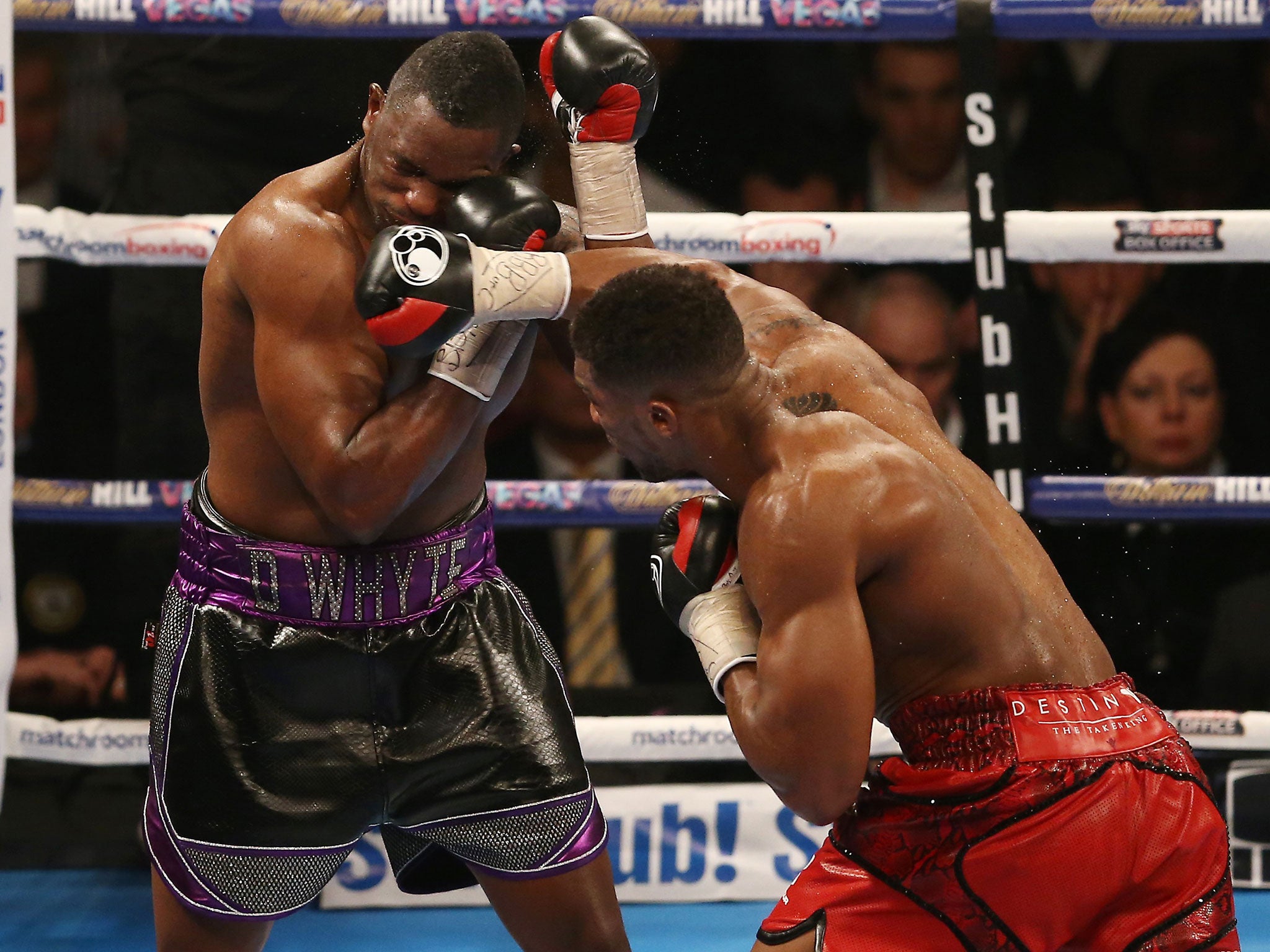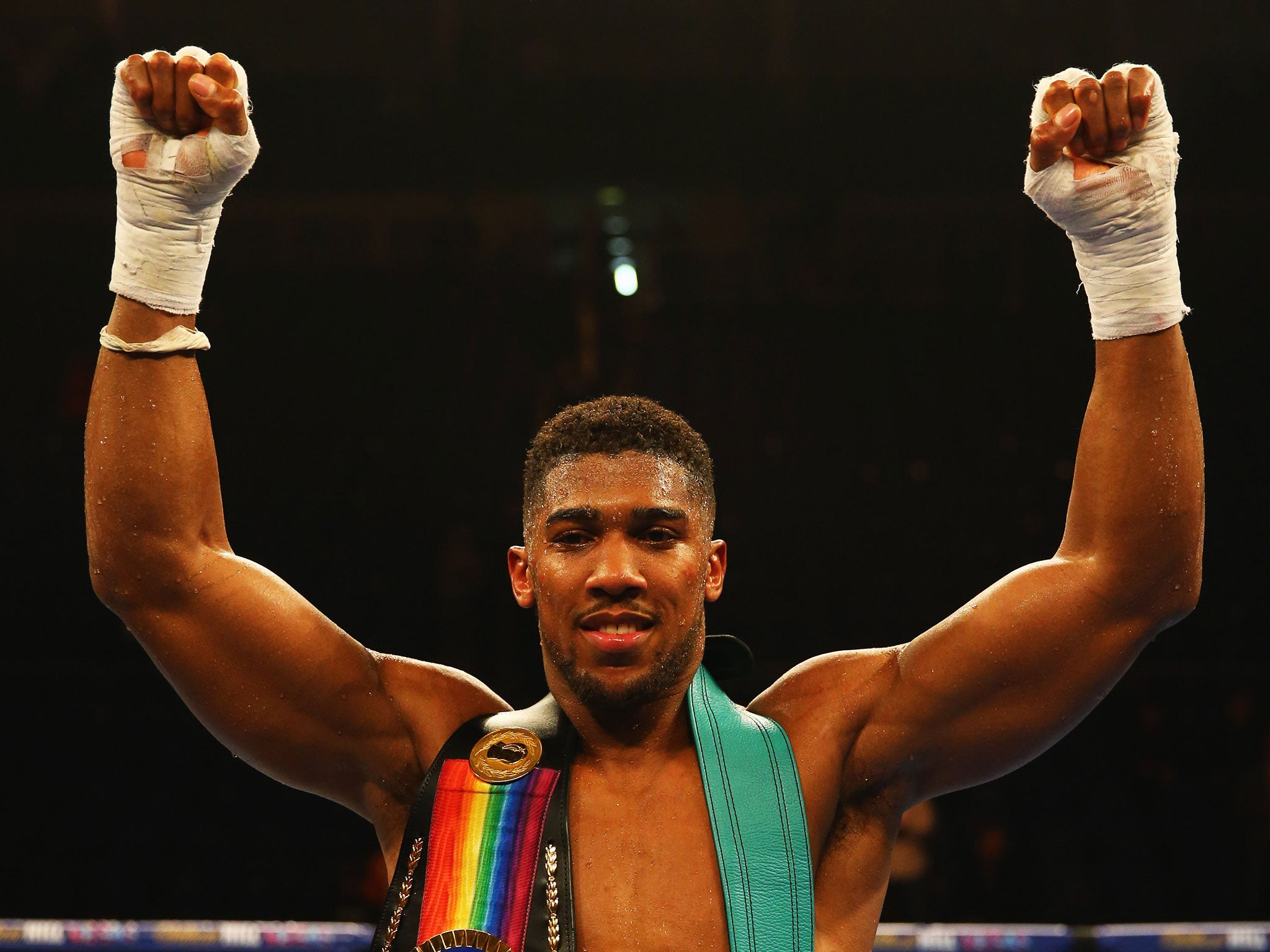Anthony Joshua still has lots to learn after coming through real test against Dillian Whyte
His seventh round win at the O2 saw Joshua claim the vacant British and Commonwealth heavyweight titles

Your support helps us to tell the story
From reproductive rights to climate change to Big Tech, The Independent is on the ground when the story is developing. Whether it's investigating the financials of Elon Musk's pro-Trump PAC or producing our latest documentary, 'The A Word', which shines a light on the American women fighting for reproductive rights, we know how important it is to parse out the facts from the messaging.
At such a critical moment in US history, we need reporters on the ground. Your donation allows us to keep sending journalists to speak to both sides of the story.
The Independent is trusted by Americans across the entire political spectrum. And unlike many other quality news outlets, we choose not to lock Americans out of our reporting and analysis with paywalls. We believe quality journalism should be available to everyone, paid for by those who can afford it.
Your support makes all the difference.It was the first proper test for Anthony Joshua and he needed the punch of his life to win the fight of his life so far. Joshua connected cleanly with a vicious uppercut to send Dillian Whyte tumbling for the count in the seventh round of a raw, sustained, controversial and memorable slugfest at the O2 in London on Saturday night. There was too much pride and not yet enough boxing intelligence, but that combination is essential for any great fight at this level.
The pair dispensed with defensive niceties for most of the fight, trading big shots, heavy, wild hooks and, at the end of the first round when the bell tolled, they were joined in the ring by their cornermen, friends and various onlookers for an illegal brawl. The break between rounds was 91 seconds, which is an extra 31 seconds that did not help either man but did add to the fervour in the crowd of 18,000.
Whyte had been hurt in round one and Joshua was on Bambi legs in round two, but still they traded big punches, with neither prepared to use much of his boxing brain; they each wanted to prove how brave they could be in an event packaged on the promise of violence. The ring invaders played their part.
Joshua follows closely British heavyweights Frank Bruno and Lennox Lewis, who both had to overcome real tests early in their careers before there was proof the hope was more than the hype.
Bruno was unbeaten in 18 fights when he had his test in 1983 at the Royal Albert Hall against a man called Floyd “Jumbo” Cummings, who was fresh from prison. Cummings caught him at the end of round one and Bruno was on his feet but out of his head when the bell sounded. The crisis was sickening, Bruno was revived in the corner, survived a few rounds and then Jumbo folded in round seven.
At Wembley in 1991, Lewis had a dangerous, unbeaten and experienced man in the opposite corner. Lewis was, like Joshua, having just his 15th fight, while Gary Mason had proved himself in 35 straight wins. Their fight remains a forgotten classic, distinguished by the gut-wrenching bravery of Mason. It ended in round seven. Mason never fought legally again and Lewis, like Joshua, had shown he could move forward.
Joshua would not, as too many fools believe, knock out the returning David Haye or the current heavyweight world champion Tyson Fury right now. They are both seasoned heavyweights, tough men that have been on their arses in fights, overcome cuts and tiredness to win.
The Whyte bout will make Joshua a better fighter, but it does not qualify him just yet as a heavyweight deity, even in a fight game splintered by average champions. It seems that Joshua, thankfully, continues to be aware of how the process works. “It’s hard to be an elite athlete, it takes time and I’m still learning and I’m still far away,” he admitted.
Lewis was just a few months younger than Joshua the night he overcame Mason; he needed seven more fights over two years before he won the world heavyweight title. Bruno was kept on the learning trail for three years and fought 10 more times before his first world title fight.
Joshua knows all about history: “It doesn’t happen overnight – you don’t become a world champion the moment you turn professional and I need the rounds to use my boxing brain.” It was the first time in 15 professional fights that he had gone beyond round three.

Even his promoter Eddie Hearn was circumspect once the fight was over: “The problem he had in that fight was emotion. I was concerned after two or three rounds because we’ve seen what happens in a fight if there’s too much emotion.”
Adding to Hearn’s fear, lightweight Luke Campbell, who also won a gold medal at the London Olympics, lost for the first time in 13 fights, beaten on points by Frenchman Yvan Mendy.
A stark contrast to the wild heavyweight clash was the middleweight fight in which Chris Eubank Jr was meant to struggle to beat Spike O’Sullivan but did so in seven rounds of cool calculation. Joshua should watch a recording of that before peering through his fingers at his fight with Whyte. Joshua can fight, but he needs time, rounds and the expectation of domination scraped from his bulky shoulders.
Join our commenting forum
Join thought-provoking conversations, follow other Independent readers and see their replies
Comments